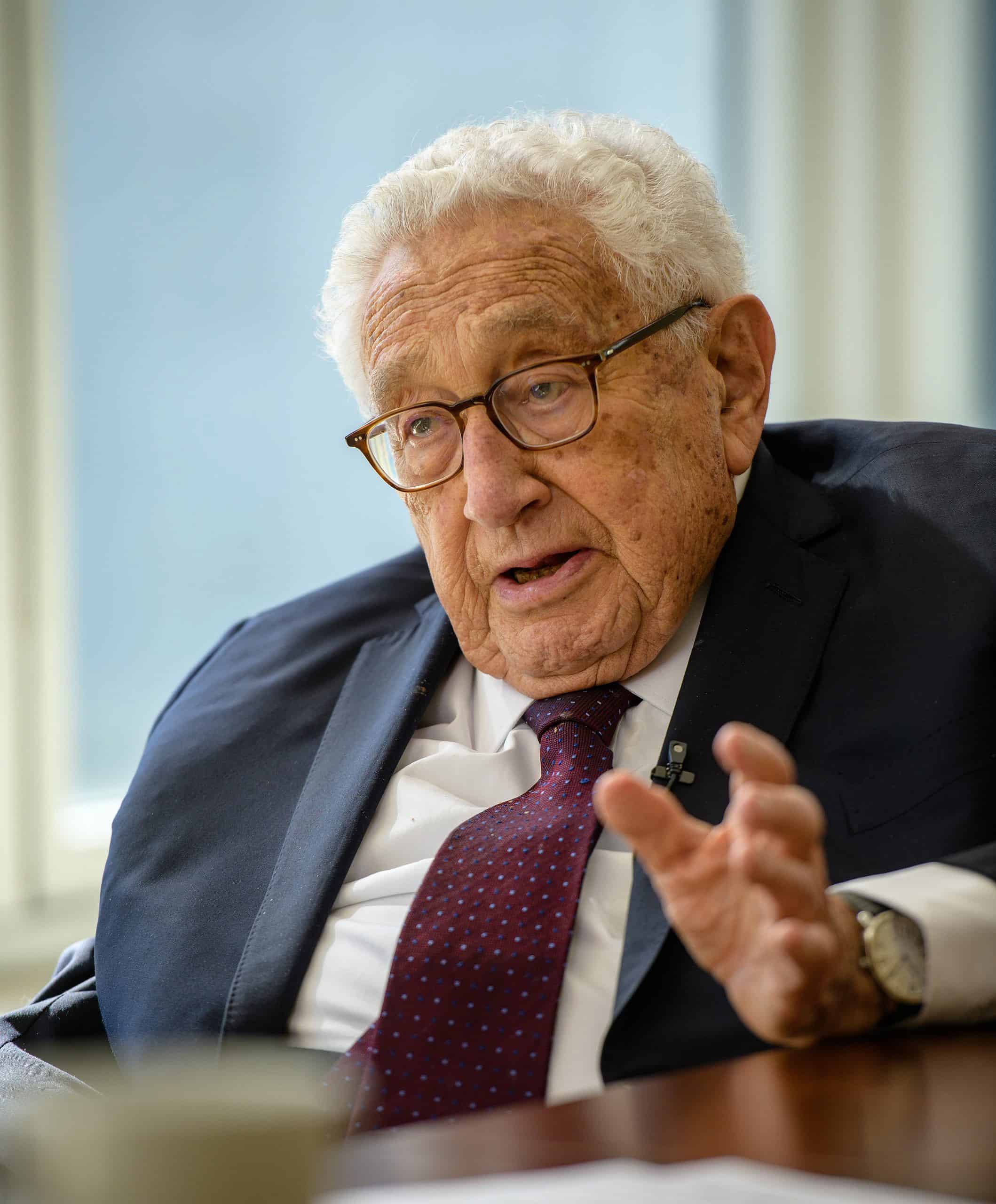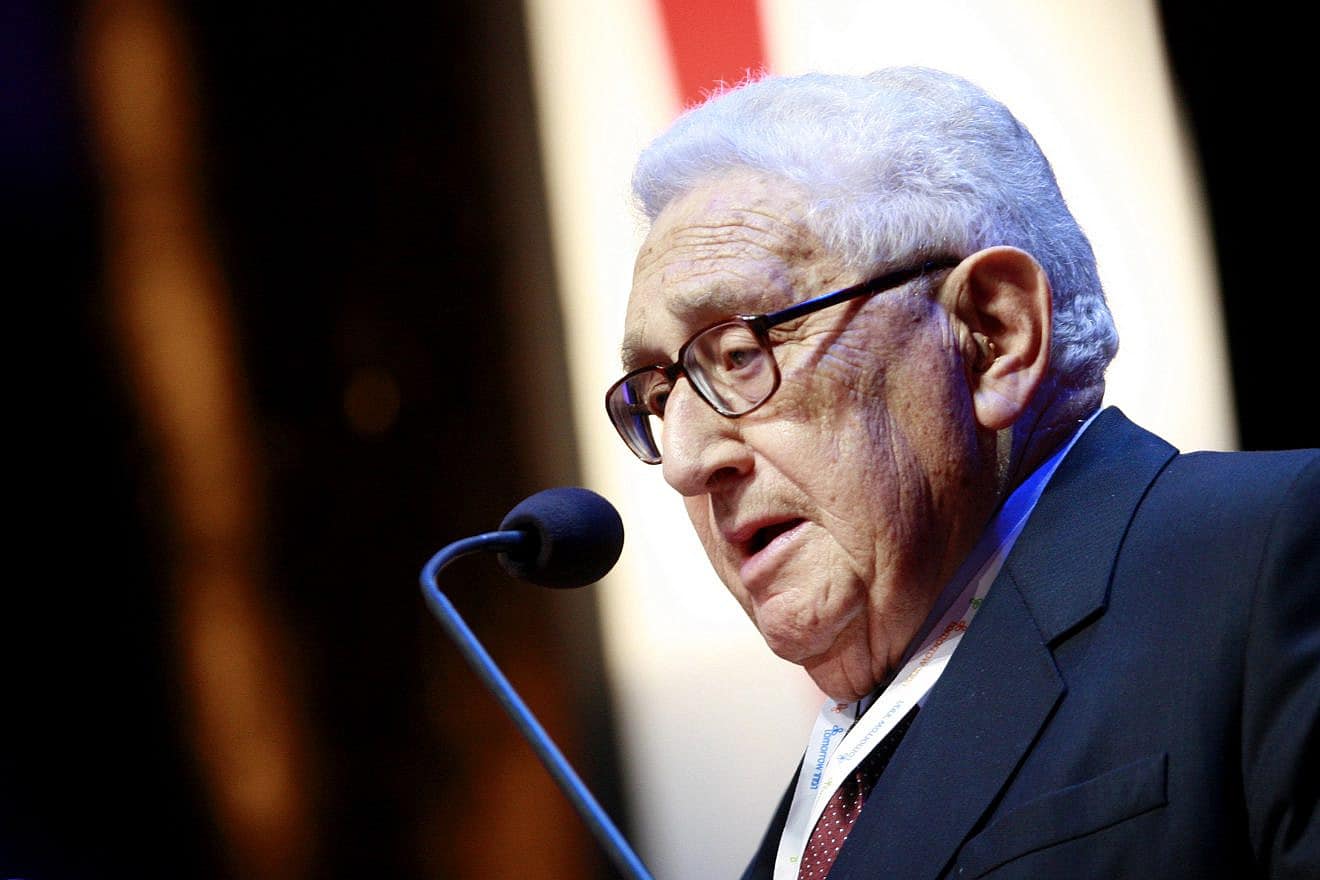On June 19, 2021, U.S. President Joe Biden and his wife, Jill Biden, released a 199-word statement on “the Passing of their beloved German shepherd Champ.”
The statement Biden issued on Nov. 30—hours after U.S. Secretary of State Antony Blinken had released a glowing 401-word missive on the passing of Henry Kissinger—was a terse, 97-word reflection on the former U.S. secretary of state and national security advisor.
Kissinger, who died at 100 on Nov. 29, didn’t receive half the ink of the late first dog.
“I’ll never forget the first time I met Dr. Kissinger. I was a young senator, and he was secretary of state—giving a briefing on the state of the world,” Biden stated. “Throughout our careers, we often disagreed. And often strongly. But from that first briefing, his fierce intellect and profound strategic focus was evident.”
Biden’s reflections on Kissinger’s death are the shortest—often by a long shot—of the 49 official statements of condolences that JNS found on the White House website.
The closest other examples are the U.S. president’s remarks on the passing of United Arab Emirates leader Sheikh Khalifa bin Zayed Al Nahyan (108 words); pope emeritus Benedict XVI (122); and Greek Orthodox Archbishop Chrysostomos II (134) last year; in addition to former Wyoming Sen. Mike Enzi (119) and former Philippines president Benigno Aquino (115) in 2021.
Each of the other 43 statements of Biden’s condolences ran at least 50% longer than his statement on Kissinger.
In 2023, Biden issued official condolences to United Steelworkers president Thomas Conway (344 words); performer Harry Belafonte (343); New Mexico Gov. Bill Richardson (324); Pennsylvania first lady Ellen Casey (319); Alaska Rep. Mary Peltola’s husband, Eugene Peltola (284); California Sen. Dianne Feinstein (270); musician Tony Bennett (234); Connecticut Gov. Lowell Weicker (232); Colorado Rep. Pat Schroeder (225); first lady Rosalynn Carter (218); musician Jimmy Buffett (217); Indiana Rep. Jackie Walorski (207); disability-rights activist Judith Heumann (180); singer Tina Turner (180); Christine King Farris, sister of Martin Luther King Jr. (171); and economist William Springs (159).
Last year, Biden devoted more than five times as much text to his statement about secretary of state Madeleine Albright (516 words). He also issued statements memorializing Queen Elizabeth II (498); Pittsburgh Steelers running back Franco Harris (477); defense secretary Ash Carter (368); basketball star Bill Russell (265); Soviet leader Mikhail Gorbachev (258); Dick Blum, husband of Feinstein (230); actor Sidney Poitier (196); actor Nichelle Nichols (177); Virginia Rep. Donald McEachin (171); and Alaska Rep. Don Young (152).
In 2021, Biden issued statements on Michigan Sen. Carl Levin (483 words); Kansas Sen. Bob Dole (462); Gen. Colin Powell (448); Nevada Senate majority leader Harry Reid (403); AFL-CIO president Rich Trumka (394); vice president Walter Mondale (376); secretary of state George Shultz (366); Gen. Raymond Odierno (335); Virginia Sen. John Warner (299); baseball star Hank Aaron (295); Georgia Sen. Max Cleland (236); Archbishop Desmond Tutu (231); Prince Philip of the United Kingdom (184); Florida judge and Rep. Alcee Hastings (183); astronaut Michael Collins (170); and Georgia Sen. Johnny Isakson (165).
Among former U.S. secretaries of state, Madeleine Albright received 430% more ink and George Shultz about 280% more text than Kissinger did.
“President Biden’s statement on Henry Kissinger comes 24 hours after the news of his death was announced publicly and is relatively ice-cold,” wrote the journalist Yashar Ali. “Pleasantly surprised … I was worried there would be a two-page statement.”
“Biden’s statement on Kissinger is like, I met him, he shared ideas, we really disagreed on things, he shared his ideas some more, condolences to his family,” added senior Huffington Post politics reporter Jennifer Bendery.
‘History-bending decisions’

Hours before Biden’s statement was released, Blinken praised Kissinger at length. “Henry was not only a student of history and strategy. Over the course of an extraordinary 100 years, he made both,” Blinken wrote.
“His family fled to the United States from Nazi Germany in 1938, when he was 15 years old. Finding refuge in America, he later wrote, ‘I personally experienced what our nation meant to the rest of the world, especially to the persecuted and disadvantaged,’” the U.S. secretary wrote. (Like Kissinger, Blinken is Jewish.)
“He loved the nation that had taken in his family and, for the rest of his life, felt a duty and a desire to serve America, its people, its idea,” he added. Blinken noted that Kissinger made “countless history-bending decisions” and “to serve as America’s chief diplomat today is to move through a world that bears Henry’s lasting imprint—from the relationships he forged, to the tools he pioneered, to the architecture he built.”
Presidents, secretaries of state, national security advisors and other leaders, from both sides of the aisle, sought Kissinger’s counsel, and the elder statesman brought “his strategic acumen and intellect to bear on the emerging challenges of each passing decade,” Blinken wrote.
“Including me—whether I was traveling to China more than 50 years after his transformative trip, or seeking his counsel as we shaped our approach to artificial intelligence, on which he was thinking, writing and advising prolifically, up to the final weeks of his life,” he added.
“Few people were better students of history—and even fewer people did more to shape history—than Henry Kissinger,” Blinken wrote.


























